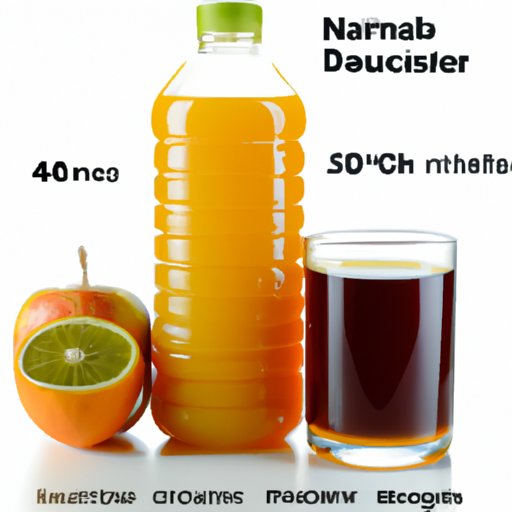Introduction
Fruit juice is a popular beverage that is widely consumed around the world. In its simplest form, it is made by squeezing or crushing fruits to extract their juices. While many people view fruit juice as a healthy alternative to sugary drinks, there are conflicting opinions about its nutritional value and potential health benefits. In this article, we will explore the pros and cons of drinking fruit juice to help you determine if it’s a good choice for you.

Comparison of Nutritional Content Between Fruit Juice and Whole Fruit
Before we dive into the potential health benefits of drinking fruit juice, it’s important to understand how it compares to whole fruit in terms of nutritional content. Fruits are naturally high in essential vitamins and minerals, such as vitamin C, potassium, and folate, as well as dietary fiber. They also contain phytonutrients, which are plant compounds that have been linked to various health benefits.
When fruits are juiced, some of the beneficial nutrients are lost. For example, most of the dietary fiber is removed, resulting in a product that is lower in fiber than whole fruits. Additionally, some of the vitamins and minerals may be degraded during the juicing process. However, the remaining nutrients can still provide health benefits.
Examining Potential Health Benefits Associated with Drinking Fruit Juice
Fruit juices contain a wide range of beneficial nutrients, including antioxidants. Antioxidants are compounds that protect your cells from damage caused by free radicals, which are unstable molecules that can lead to chronic disease. By consuming antioxidant-rich foods, such as fruit juices, you can help reduce your risk of developing certain diseases, including cancer, heart disease, and diabetes.
In addition to providing antioxidant protection, some studies have suggested that drinking fruit juice can improve digestive health and reduce inflammation. It can also help boost your immune system and keep your skin looking healthy. However, more research is needed to confirm these potential benefits.

Investigating the Effects of Added Sugar in Fruit Juice
Many commercially available fruit juices contain added sugar, which can have a negative impact on health. Consuming too much sugar has been linked to an increased risk of obesity, type 2 diabetes, and heart disease. It is also important to note that sugar-sweetened beverages, including fruit juices, are high in calories and can contribute to weight gain if consumed in excess.
To minimize the amount of added sugar you consume, check the label of any fruit juice product you buy. Look for products that are labeled “no added sugars” or “unsweetened” and opt for those with the lowest sugar content. Additionally, avoid buying fruit juices that contain artificial sweeteners, as these can have adverse effects on your health.
Exploring the Differences Between Fresh-Squeezed and Processed Fruit Juice
When it comes to choosing a fruit juice, you should also consider the difference between fresh-squeezed and processed juices. Fresh-squeezed juices retain more of their natural vitamins, minerals, and phytonutrients, making them a better choice nutritionally. They also tend to taste better and have a shorter shelf life than processed juices.
On the other hand, processed juices are typically cheaper and have a longer shelf life than fresh-squeezed juices. However, they often contain added sugar and preservatives, which can detract from their nutritional value. Additionally, some of the beneficial nutrients may be lost during the processing and pasteurization of the juice.
Analyzing the Importance of Portion Control When Consuming Fruit Juice
While fruit juice can be a nutritious addition to your diet, it’s important to practice portion control when consuming it. The American Heart Association recommends limiting your daily intake of fruit juice to no more than 8 ounces (250 ml). Additionally, you should stick to 100% fruit juices without added sugars or other ingredients.
If you find it difficult to limit your portion sizes, try diluting your juice with water or mix it with sparkling water for a refreshing drink. You can also opt for smaller juice boxes or individual servings to help you stay within the recommended portion size.

Investigating the Role of Fruit Juice in a Balanced Diet
Fruit juice can be part of a healthy, balanced diet. However, it should not be your only source of fruit. To get the most out of your diet, aim to incorporate a variety of whole fruits and vegetables, as well as lean proteins, low-fat dairy products, and whole grains. Additionally, limit your consumption of processed and sugary foods and drinks, including fruit juices with added sugars.
Conclusion
Fruit juice is a popular beverage that can provide some health benefits when consumed in moderation. While it contains fewer nutrients than whole fruits, it is still a good source of essential vitamins and minerals, as well as antioxidants. However, it is important to limit your intake of added sugars and processed juices, as these can have a negative impact on health.
Overall, fruit juice can be a healthy part of your diet when consumed in moderation and combined with a variety of other nutritious foods. By following the tips outlined in this article, you can enjoy the benefits of fruit juice while limiting your intake of added sugar and other unhealthy ingredients.
(Note: Is this article not meeting your expectations? Do you have knowledge or insights to share? Unlock new opportunities and expand your reach by joining our authors team. Click Registration to join us and share your expertise with our readers.)
